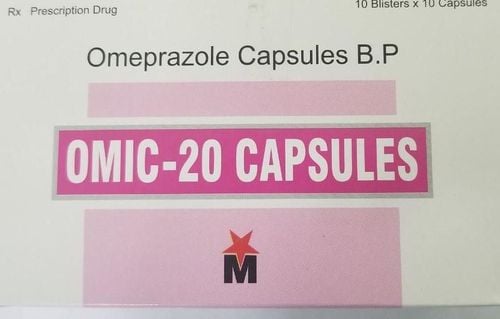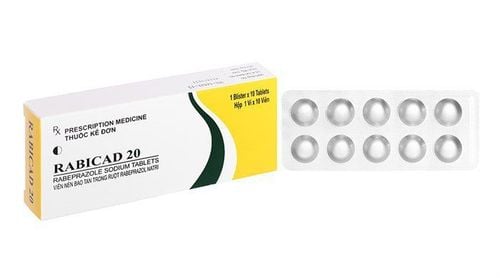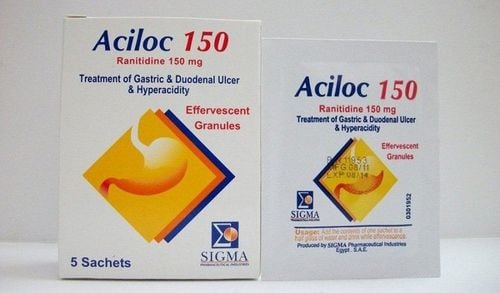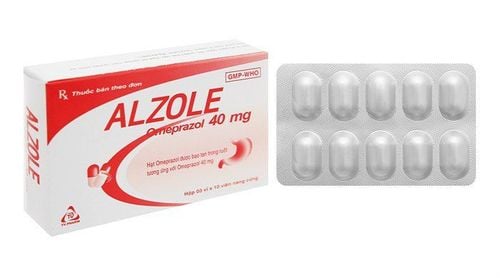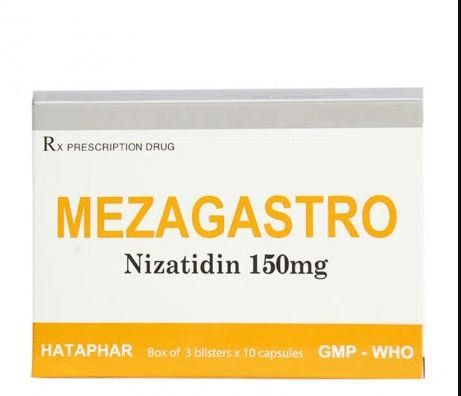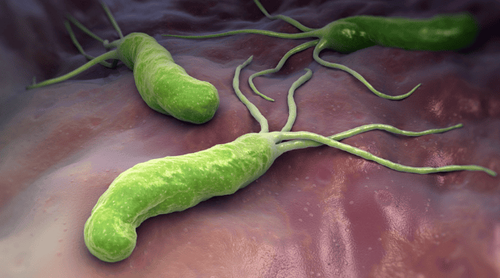This is an automatically translated article.
Pantosan is a drug belonging to the group of gastrointestinal drugs, often used to indicate the treatment of peptic ulcers, esophagitis, reflux esophagitis, etc. To use this drug to achieve the best and limited effectiveness To prevent side effects, people need to know the information about the use, use, and dosage of the drug below.
1. What is Pantosan?
Pantosan is a pharmaceutical product manufactured by ACME Formulation (P) Ltd, India and registered by Yeva Therapeutics Pvt., Ltd. Pantosan belongs to the group of gastrointestinal drugs with the main active ingredient being Pantoprazole sodium sesquihydrate 20mg. The drug is used for the treatment of gastric ulcer, duodenal ulcer, reflux esophagitis, acid secretion disease...
The drug is prepared in the form of enteric-coated tablets and is packaged in box specifications. 3 blisters x 10 tablets, each tablet contains 20mg pantoprazole and other excipients just enough.
2. Uses of Pantosan
2.1. What does Pantosan do? Pantosan contains the active ingredient Pantoprazole which is a selective proton pump inhibitor (proton pump inhibitor) on the cell wall of the stomach. Therefore, the drug acts faster and more effectively than other drugs. The healing rate of stomach ulcers (scars) can reach 95% after 8 weeks of treatment.
The drug also has little effect on gastric volume and pepsin secretion, as well as gastric endothelium and gastric contractility.
2.2. Indications for use of Pantosan Pantosan is indicated for the treatment of a number of diseases in the gastrointestinal tract as follows:
Treatment of gastric and duodenal ulcers. Treatment of reflux esophagitis and gastric acid hypersecretion. In combination with antibiotics to eliminate Helicobacter pylori (HP) infection. 2.3. Contraindications Pantosan is not recommended for people with hypersensitivity to the ingredients in the formula and children under 18 years of age.
3. Usage, dosage
In order for Pantosan to promote its full therapeutic effect, the patient needs to use the drug correctly and in the correct dose according to the prescription prescribed by the doctor.
3.1. The drug is taken by mouth directly and the patient should swallow the tablet whole with cooled boiled water. Do not chew, break or disperse the drug, it will affect the composition and effectiveness of the drug.
Note that the patient should not take the drug with alcohol, beer, bottled soft drinks, tea or carbonated, alcoholic beverages... will affect the effectiveness of the drug.
3.2 Dosage for Gastric - Duodenal Ulcer: Take 40mg (2 tablets)/day and take it for 4-8 weeks. Reflux esophagitis: Take 40mg (2 tablets)/day for 8 weeks. After 8 weeks, if the ulcer does not heal, need to take another 8 weeks. The above is the recommended dose, and the specific dose will be prescribed by the doctor after examining and understanding the specific condition of the patient and the level of infection. Therefore, in order to get the best dose, the patient should visit the doctor and take the medicine as prescribed and prescribed by the doctor. Absolutely do not self-medicate, adjust the dose without the doctor's prescription.
4. Pantosan side effects
Pantosan side effects are usually mild, transient, and pass quickly. Some common side effects when taking the drug include: headache, abdominal pain, diarrhea.
These side effects will go away after stopping the drug, but if the above side effects become severe and persistent or experience other unusual signs, the patient should inform the doctor for advice about safe handling.
5. Drug interactions
Pantosan can interact with a number of other drugs, which can be synergistic or antagonistic, but both affect the effectiveness of the drugs being taken or increase side effects.
Therefore, in order to avoid drug interactions that affect health and disease treatment, the patient should tell the doctor about all drugs, functional foods and herbs being used for advice, Adjust or change dosage, prescription accordingly.
Pantosan interacts with drugs that depend on the pH of gastric acid, such as Ketoconazole.
6. Notes and cautions when using Pantosan
In order to ensure safety and achieve the best effect when using Pantosan, patients should note and be cautious of the following issues:
The drug should be used when prescribed and prescribed by a doctor, absolutely. Do not arbitrarily change, adjust the dose, cancel the course of taking medicine without consulting the doctor. It is necessary to exclude the risk of malignancy before treatment and drug use. Use with caution in patients with severe hepatic impairment. Pregnant women should consider and consult a qualified doctor before taking the drug for specific advice and indications to avoid affecting the pregnancy. For nursing mothers, the benefits and risks for mother and child should also be weighed. Use medication only when absolutely necessary and must be prescribed by a qualified doctor. In order to ensure the safety of the baby, in the event that the drug must be taken, the mother should stop breastfeeding while taking the drug.
7. Missed dose, overdose
Missed dose: If you forget to take a dose, you can take it as soon as you remember within 1-2 hours compared to prescribed. However, if the missed dose is almost time for the next dose, take the next scheduled dose without skipping the missed dose. Absolutely do not take 2 doses, overlapping doses at the same time to avoid overdose or increase the side effects of the drug.
Overdose: When there are abnormal signs of suspected overdose or side effects of the drug, it is necessary to stop the drug. Then immediately call a specialist for specific advice on how to handle it, and in case of danger, it is necessary to take the patient directly to a medical center for timely emergency treatment.
8. How to store medicine
You should store the medicine in a dry place, away from moisture and away from sunlight with a temperature not exceeding 30 degrees C. Keep the medicine out of sight and reach of small children and pets. For drugs that have expired or are damaged and are no longer in use, collect and dispose of them properly according to the instructions of your doctor, pharmacist or waste disposal company. Note that the medicine should not be thrown or flushed into the toilet or under the household tap. The information about Pantosan in this article is for reference only. The drug information provided above is not intended to diagnose or treat disease. Therefore, patients need to consult and visit a specialist to be prescribed the right drug, in the right way and in the right dose to ensure safety for health and effective treatment of the disease.
Follow Vinmec International General Hospital website to get more health, nutrition and beauty information to protect the health of yourself and your loved ones in your family.
Please dial HOTLINE for more information or register for an appointment HERE. Download MyVinmec app to make appointments faster and to manage your bookings easily.




